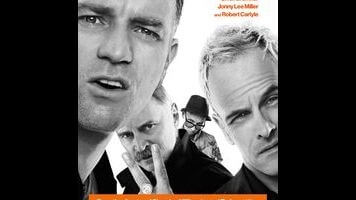Drawing a few story ideas from Porno, Irvine Welsh’s sequel to the original’s source novel, the film reintroduces Renton as a white-collar divorcée who returns to Edinburgh after suffering a heart attack on a treadmill; in a cute nod to the first film, running has taken the place of drugs in his life. Simon is still a crook, but he has made his own move up the ladder of respectability, trading heroin for cocaine. As for the meek and long-suffering Spud (Ewen Bremner), he has remained exactly the same, apart from a bald spot on the back of his head that resembles a monk’s tonsure, in keeping with his lonely existence. The unexpected return of Renton, who has lived for the past two decades in Amsterdam, eventually forces the trio back together, bringing with it the wrath of their graying psychopathic pal Begbie (Robert Carlyle). He’s recently escaped from a prison hospital and is hiding out at the warehouse of dealer-turned-fence Mikey Forrester (Welsh, reprising his cameo from the first film), still sore about the tennis bag full of cash that Renton stole from the crew to start a new life.
Factor in the character of Veronika (Anjela Nedyalkova), the Bulgarian prostitute who helps Simon blackmail rich men, along with a few dozen more callbacks and cameos and a subplot about European Union funds being used to open a brothel, and the incongruous, quantity-over-quality style of John Hodge’s screenplay begins to grind. (One can imagine a deleted scene in which Renton hails a cab only to discover that the driver is The Worst Toilet In Scotland.) Despite the addition of two decades of experience, Boyle comes across as a less confident director than he did in the original. The trickery and technical finesse of Trainspotting’s limited resources (still impressive after all these years) has been replaced with a grab bag: Dutch angles, a daydream parody of Raging Bull, a jarring action-movie climax. This collage aesthetic of distractions fits Boyle’s winningly nonsensical Trance, but here one can’t help but wonder whether a sequel to Trainspotting needed, say, an interesting close-up of hotel linens.
But there is one scene that conjures the spirit of the original. It’s a sequence in which Renton and Simon, who have made amends, revert to their old scam-artist ways for a night by crashing a gathering of Protestant sectarians, where they improvise a Borat-esque anti-Catholic drinking song to blend in. It’s no coincidence that this is the only portion of T2 that hearkens back to the first film’s episodic flow, and the only one to feature extensive expository narration from Renton, as Trainspotting did. McGregor has returned to the role that first made him a star, though one can hardly call this Renton the same character. Instead of the charismatic troublemaker of old, he has become a cypher of middle-aged concerns, his “choose life” monologue rehashed as a pissy harangue in a restaurant. In a way, that’s the point: Renton and Edinburgh have changed to the point that even the familiar seems wrong, but Spud, Begbie, and the former Sick Boy haven’t. T2 manages to get some mild comic mileage out of the escaped convict Begbie’s attempts to bond with his straitlaced son, who humors his dad by joining him on break-ins, and wrings sympathy from the sad Spud, but mostly it inspires nostalgia—for the much better film that many of the people involved made 21 years ago.









































